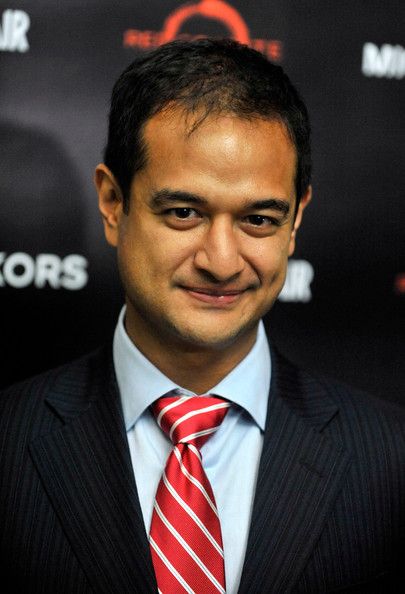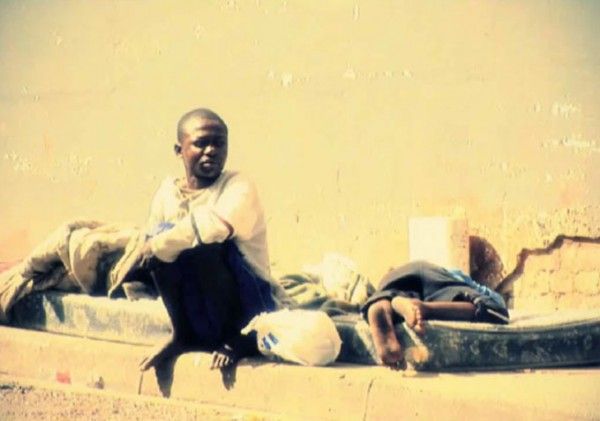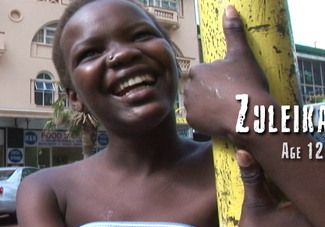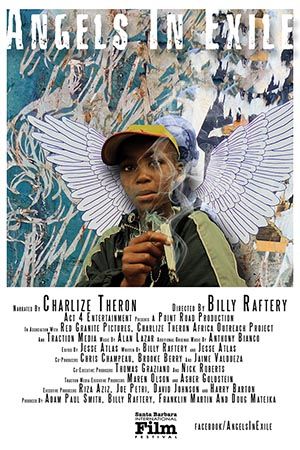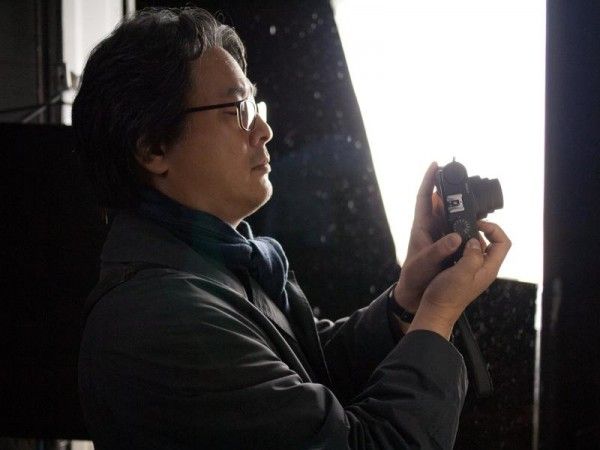The documentary Angels in Exile, which recently screened at the Santa Barbara International Film Festival (SBIFF), provides and intimate look into the lives of the street children of Durban, South Africa. Narrated by Academy Award winner Charlize Theron, these children search for a better life, but find only a world of prostitution, HIV/AIDS, trafficking, drug addiction and extreme violence.
During this recent exclusive interview with Collider, producer Riza Aziz – founder, chairman and CEO of Red Granite Pictures – talked about how he got involved with Angels in Exile, why it’s such an important topic to make people aware of, and hoping it can really help to make a difference. He also talked about Red Granite’s business model of producing three to four films a year (one of which will be a tentpole film with a big budget while the others are medium-sized films), why they wanted to sign on as producers for The Wolf of Wall Street (directed by Martin Scorsese and starring Leonardo DiCaprio), working with director Alexandre Aja on Horns (starring Daniel Radcliffe), when he expects to see cuts of each of those films, and how he’ll next be going into production on The Brigands of Rattleborge, a violent revenge western to be directed by Chan-wook Park. Check out what he had to say after the jump.
Collider: How did you come to be involved with this documentary? What stage was it in when you came on board?
RIZA AZIZ: By the time Red Granite Pictures and myself got involved, they were already 80% of the way toward completing the documentary. The way we got involved with Billy [Raftery] and Adam [Paul Smith] and the project itself was through Charlize Theron’s Africa Outreach Project. We have a very close relationship with them and have done some work with them, in the past couple of years. Charlize was very vocal about her support for the project, and she approached us to see if we’d be interested in coming to help finance and help the documentary get completed, and go through the process of sending it to market. We love Charlize and her team. They’re a bunch of amazing people, so we said yes, immediately.
Having a big name like Charlize definitely helps, and it dovetails nicely with what she’s doing with Africa Outreach Project. I’ve had the pleasure of seeing, firsthand, what she’s trying to do in various places and it’s pretty impressive. A couple of years ago, we made a donation to her project and we said, “Anytime we make donations, we’d like to see where the money goes.” She said, “We’ll arrange an excursion over to the cities that we’re trying to help,” we spent maybe five days at a place called Port Elizabeth and it’s just sad to see a lot of the things happening there. A lot of kids in schools, even though they’re very educated in things like math and art, basic things like safe sexual habits and the concept of AIDS aren’t taught. It’s frightening. They somehow believe AIDS is a Western propaganda tool to keep the African people underground.
It’s very scary, what’s going on. So, what Charlize and her project is trying to do is open up the taboo subject of AIDS and safe sex, and all of that. It’s pretty impressive, but it’s a long-term project. When you educate kids, you don’t see the fruits of it until the next generation. The five days I spent there definitely opened up my eyes to what was going on, over there. After that, we helped arrange a fundraiser for her project and it’s been a success. We hope to keep maintaining this good relationship.
Why was it important to you to specifically make people aware of what’s going on, on the streets of Durban, South Africa?
AZIZ: It’s pretty powerful stuff. With this kind of documentary, it’s easy for someone to do a take on it that’s more of a macro picture of what’s going on in South Africa. The trouble with that kind of approach is that you do get lost because you can’t find yourself anchoring to specific people and you don’t have that emotional connection. So, what the team, with Billy [Raftery] and Adam [Paul Smith], have done was to narrow in on two main protagonists that had issues that were symptomatic of the youth in South Africa. Having Zulieka and Ariel as your leads gives you the emotional grounding for you to get invested into the whole documentary. And because it’s symptomatic of what’s going on, you do get the bigger picture, as well. When you talk about street violence too often, it all becomes a cliché. But, once you see something like this, on the ground level, it becomes way more real. It’s pretty frightening, actually, what these kids go through. Kudos to the people who are trying to help them. The Umthombo Organization have been in a number of dangerous situations, trying to protect these kids from disgruntled parents and rival street gangs. It’s just not pleasant, at all.
Is it more rewarding to not just get behind this documentary then, but also be involved with something that can make a difference and really help change things?
AZIZ: Yes. You have to get involved from top to bottom, and bottom to top. It’s one thing to actually see for yourself what’s going on over there and try to be hands-on with projects like this. But, when you have a film that’s as important as this one, the challenge is to get it to a wider audience, so they can access this kind of information. When it comes to street kids, violence and guns, it’s not an easy subject and there’s no easy answer. People do get emotional and they’re touched by this sort of thing. There’s a very fine line with wanting to make people aware, but at the same time, you don’t want to turn them off. It’s tough. But, with this film that Billy did, it treads that fine line. I’m just very, very happy it made it to SBIFF and it’s gotten somewhat of a wide audience. We’re just going to keep marketing the film, as we go along. When horrific things happen, one outgoing message we want to put across to people is that we’re not the only ones facing that same issue. There’s a sense of commonality. I hate to use the word commonality because I don’t want to equate what’s going on in South Africa with America, but when you see common elements, it can be a catalyst for some kind of approach that could help fix the problem. As long as you have films like this prompting debate, that’s a start.
When and how did Red Granite Pictures come about, and what exactly does a film production, finance and international sales company do?
AZIZ: Basically, Red Granite came into being in 2010 and we have a business model of producing three to four films a year, one of which will be a tentpole film with a big budget, like The Wolf of Wall Street, to be complimented by two or three medium-sized films. What we mean by production, financing and sales is that we write a check for the movies that we do, but we’re also intimately involved in every stage of production. Our philosophy is that the best way to protect our investment is to be close to it. We’re involved in things like script meetings and casting, and we’re on set. With The Wolf of Wall Street, me and my co-producing partner, Joey McFarland, were in New York on the set, pretty much every day, to make sure that things were running as they should be. When you’re making decisions and having arguments about whether you should shoot an extra scene or add an extra day, it gives you a bit more of a context to talk about something like that when you actually know what you’re talking about. We do pretty much everything to do with production, at a lot of stages, as well as financing it.
What was it about The Wolf of Wall Street that made you want to get involved with that film?
AZIZ: The pedigree of the talent involved. Obviously, when you hear it’s Martin Scorsese and Leonardo DiCaprio, you don’t think twice. Also, the subject matter was fairly close to me because I used to be in finance in London, and it speaks very clearly to what I went through, all those years ago. And even though there’s Wall Street in the title, Wall Street is pretty much just a backdrop to the film itself. It’s not about finance. It’s literally the story of a guy who comes up from nothing, gets everything overnight and becomes rich, and in that journey from nothing to everything, he gets sidetracked with all the drugs, the hookers and the alcohol. And once he gets to the top, he gets taken down by the government. When you see the film, it’s a good snapshot of what American capitalism is like. It’s pretty interesting. And you’ll see Leo doing things he hasn’t done before. It’s actually pretty out there.
When you do a film like that, that has that level of talent involved, is it easier to get the film made, or is it more challenging to deal with talent of that scale?
AZIZ: Both, actually. The reason we were able to get our hands on the film, in the first place, is because we have very close relationships with DiCaprio and his team. When we were talking about various things we wanted to do together, he said, “Well, we have a few things cooking, but the main project that we’re really wanting to get off the ground is The Wolf of Wall Street, which is in turn-around at Warner Bros.” In 2007, they wanted to do the film, and Marty and Leo were on board, but there was some kind of tug-of-war between Paramount and Warner Bros., so they never got the movie made. So, Leo and Marty ended up doing Shutter Island and the project stayed on Warner Bros.’ shelves. We bought the script and the book rights from Warner Bros. and signed Leo on, and then waited for Marty to finish with Hugo and signed him on. Once you get those two guys on board, it’s a fast-moving train, right after. It’s been a great ride, so far.
When you have those kinds of names involved, it just makes your job, keeping the production on track and keeping everyone motivated, that much easier, but those guys are intense. They’re constantly coming up with great ideas, so sometimes the challenge is to rein them in a little bit and have a bit of balance. When Marty and Leo get that kind of collaboration going, they have this shorthand where they know what the other one is thinking or talking about, in two or three seconds. It’s an interesting process that they go through, but by and large, it’s been a positive experience. Having spoken to Marty’s camp and Leo’s camp, they said they’ve never been happier. They were laughing and having a great time on set. When ideas come out that easily, it shows they’re having a great time, creatively. For us, as filmmakers, that’s all that matters. We want our talent to express themselves and have a good time.
Is there a point where you typically get to see a cut of the films that you’re involved with?
AZIZ: With The Wolf of Wall Street, Marty is very close to the editing process, to the point where he will not allow anyone else to jump in until he feels it’s absolutely necessary. I’m assuming we’ll need 30 to 35 weeks for Marty to sit in his editing room with Thelma [Schoonmaker] and get a first cut of the film together, but we’re patient. We trust his team, we trust Marty and we trust Thelma, so I’m not so worried about that.
With Horns, which we just did with Alex Aja and Daniel Radcliffe, we’re going to Paris very soon to sit down with Alex in the editing room, to have a look at the first assembly of the footage. It depends. Different filmmakers are a bit more open to having producers come and sit in on the editing process. Alex is a bit more open. Marty is a bit more protective. I’m not saying which is right or wrong. It just depends on the habits of the filmmaker.
Do you currently have other films in development, or do you know what you’re going into production with next?
AZIZ: Yeah, we’re in the prep stage on a film, called The Brigands of Rattleborge, that is a violent western. It was the top of the Black List in 2006, and it’s great. We’ve got Chan-wook Park signed to direct the film, and we’re very excited to work with director Park. He just premiered his first English-language film at Sundance, a couple weeks ago, called Stoker, with Mia Wasikowska and Nicole Kidman, and it’s gotten some really good reviews.
Brigands is centered around the story of two guys having to protect their town from a bunch of Brigands who come in to raid the village and rob the town. It’s pretty much a story about revenge. With a guy like director Park, who’s done Oldboy, Sympathy for Mr. Vengeance and Lady Vengeance, there’s no one better out there to take on the themes of revenge and redemption. He is extremely creative with the way he takes on certain scenes. Being South Korean, he’s got that Asian flare to his style, which we find very interesting. And to merge that style with Brigands, which is a very quintessential American story set in the west with cowboys, is very exciting.
Are you looking to continue to produce both narrative features and documentaries?
AZIZ: To be honest, documentaries are not our core competency, right now. We’re just focused on feature films, but I don’t see why not. Down the road, if we expand our team large enough, we would look at documentaries more in-depth and take them more seriously, as the company goes on. At the moment, it’s all about bandwith and capacity. I’ve got a solid team that can handle three or four films a year, but to add anything more than that would be tough. So, give us three or four years, when we expand our team a bit more. I would love nothing more than to look at more documentaries dealing with issues that are very topical to the country at large.


